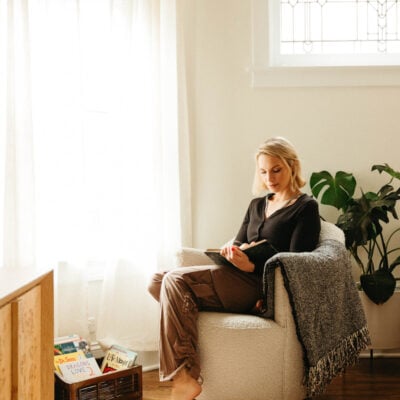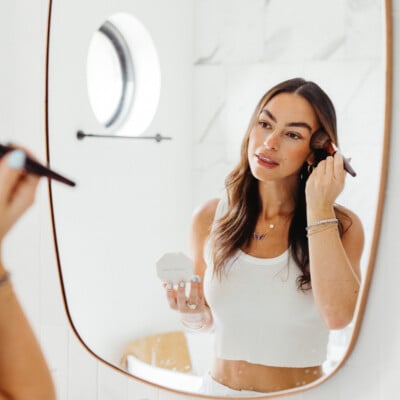Lauren Zielinski is a Certified Nurse-Midwife, and the founder of a grassroots women’s health movement called New Moon Rising Events. New Moon Rising works in cities across the US to hold free, day-long workshops that foster discussion about reproductive health, political advocacy, natural medicine options, and community connections.
I. Feel. You. Navigating our option-overloaded world and making choices about what we do and don’t put in our bodies is becoming increasingly difficult. It feels more important than ever to be thoughtfully informed and deliberate in our actions — from filtered water, to paraben-free shampoo, to antibiotic-free chicken, the list goes on. And then we add the question of birth control to the mix… insert huge question mark.
It’s no wonder that the current trend of using hormone-free or no birth control at all is rising in popularity amongst women. Why put hormones in our bodies when we strive to be purists in every other aspect of our lives? I ask this though: How many of us smart women with access to virtually ALL of the knowledge via the web actually know the facts?
Asking “Is birth control bad for me?” is a very fair question. Below, I’ll help you navigate the answer to it for yourself, because of course there’s no easy yes or no. Here’s a quick and dirty guide to the research about the safety of birth control and the things you need to think about when choosing to use or forgo it.

1. Trust Science
Women have used birth control for more than 50 years. The safety, side effects and risks have been very well researched. Those are not statements to take with a grain of salt. It’s evidence. I think of it this way: not believing in the science behind medical research is like not believing in climate change. If you took every year of research on the birth control pill and multiplied it by the number of women who were studied, the amount of research on the birth control pill totals to 819,175 years of experiences and data. That is no joke. So in short, to alleviate that fear in the back of your mind: NO. There is not hidden information out there waiting to sneak up and bite you when you’re 50 that’ll make you wish you never took that pill. You won’t be on your death-bed at age 37 cursing the freedom your IUD gave you for the last 10 years. If birth control was not overwhelmingly safe for the majority of the public, when taking into account personal risk factors, it wouldn’t be out there on the market available for the whole world to consume. In fact, large bodies of evidence actually suggest some methods of birth control are protective against certain female cancers. Whoa! You might experience side effects from some birth controls as better or worse than others for you personally, and you may not be a safe candidate for every single kind if you have certain medical conditions, but if you know the risks and you’re well advised, birth control is overwhelmingly safe for the majority of the population.
2. What Else is Going On in Your Life?
I routinely visit with patients who start a new birth control method and will simultaneously experience some sudden change in their life that is unpleasant, that they then understandably blame on their new method of birth control, which they then rapidly abort use of. We love to blame birth control for everything. I know, as I myself had an IUD pulled out 2 months post-insertion by my reluctant midwife because I was very sure my new onset of headaches were relative to my new IUD… only to find I was actually diagnosed months later — no IUD in place — with a very rare headache condition I actually had for years before the IUD. It has nothing to do with birth control, it’s a brain condition. I now have another IUD and love it.
I encourage all women to refrain from blaming birth control for every issue that pops up in life. Take into account all concurrent life stressors — big moves, break ups, new jobs, family stress, new diets, sleep schedule, allergies, travel and so on. Our lives are so multi-factorial and I whole-heartedly believe that stress has more noticeable side effects than birth control and is much more common. Consider the reality that there are many moving pieces in life before you decide to quit your new method of fertility control for good.

3. Give Your Body Time to Adjust
3 to 6 months people. Depending on the method of birth control you choose to use, it often takes time for your body to get into its own groove with a new player on board. As your hormones adjust you might have some funky side effects (acne, spotting, feeling bloated). I urge all of my patients to hang in there and give their bodies a little time to get into the rhythm of birth control before ditching. If your symptoms are life-rocking and absolutely intolerable, of course, no one should be suffering. But often times weird side effects dissipate in time. Our bodies are programmed to fertility month after month, hence, it’s important to be patient as you use science to trick your body out of baby-making mode.
4. Be Realistic
Birth control can be a daily commitment or as simple as an insertion procedure once every 10 years. Every method is different and often times what works for one person will definitely not work for another person. Additionally, trial and error is not uncommon. Don’t be disappointed if the first method you try isn’t perfect — chances are, another will be! I also encourage you to get your partner involved in the decision-making if you feel comfortable with their contribution. Be real with yourself and your level of commitment, or lack there of. We have options ladies; explore what fits.

5. Ask Your Body How it Feels
So you’ve picked a method and it’s been 3-6 months at least: it’s time to evaluate. Get in tune with your bod! I tell my friends and patients all the time to get out the theoretical scale and weigh it out. Do the benefits outweigh the things you don’t dig as much? Do you feel like your body has balanced out and adjusted in a way you can handle? Is it practical for you? If you’re not feeling like yourself on birth control and you’ve accounted for outside life forces, are thinking realistically, and are taking good care of yourself — nutrition, sleep and stress-wise — it’s okay to say hey, I’m just not into you, and try something different.
6. You Don’t Have to Marry Your Method
Most birth control is temporary, so if you’re feeling nervous about picking one and taking the plunge, remember that unless it’s the shot, the hormones from your birth control will be excreted from your body within a 1 to 6 weeks. I encourage you to be flexible and open-minded, and to have realistic expectations about what a method can offer. In the end, you are always the boss and can quit it, pull it, or stop drop flip it and reverse whichever way you want.

7. Not Using Birth Control is Totally An Option
There are a few different ways to track fertility and control pregnancy without using traditional forms birth control. I encourage you to learn these methods very well if you’re interested. It’s super important to be well educated on tracking your ovulation (this means more than just punching dates into an app), be in-tune and comfortable with your own body and bodily functions (think texture of your cervical mucus), and be realistically prepared and okay with the chance of pregnancy when using natural methods. The data says that fertility awareness methods are 76-88% effective, and the withdrawal method (pull out method) is 76% effective. Is a 24% chance of a kiddo alright with you? Totally your choice! Do your birth control thing au natural if you dig it lil mamas.

If you don’t have any major medical diagnoses and are an overall healthy individual, then choosing a safe birth control should be easy from a risk standpoint. Phew! Doesn’t that feel good? Additionally, medical complications that pop up while using birth control are relatively rare.
Lastly, trust that your provider will help you navigate any medical complications you may have and help you pick a safe option.
Cruise through this document I made for you and hone in on a method that sounds good to you. Read about the side effects, the risks and benefits, and make sure you don’t have any of the medical issues listed in the last section. Empower yourself with this information. It doesn’t have to be confusing or intimidating!




